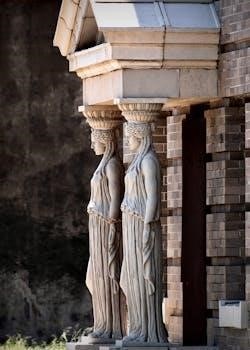The Corpus Hermeticum‚ a collection of writings attributed to Hermes Trismegistus‚ is a foundational text of the Hermetic tradition. These texts‚ mistakenly dated much earlier by Church officials‚ survived and became influential‚ especially during the Renaissance. Today‚ the Corpus Hermeticum is available in various formats‚ including PDF.
What is the Corpus Hermeticum?
The Corpus Hermeticum is a collection of theological-philosophical texts‚ traditionally ascribed to the mythical figure Hermes Trismegistus‚ a syncretic combination of the Greek god Hermes and the Egyptian god Thoth. These writings‚ dating from the early centuries of the Common Era‚ delve into topics such as cosmology‚ the nature of God‚ the human soul‚ and the path to spiritual enlightenment. The texts are not a unified work but rather a collection of discourses‚ dialogues‚ and revelations‚ often presented as instructions from Hermes to various disciples. They form the core of the Hermetic tradition‚ an esoteric current that has influenced various spiritual and philosophical movements across history. The Corpus Hermeticum covers a range of subjects‚ including the creation of the universe‚ the relationship between humanity and the divine‚ and the nature of reality itself. It serves as a guide for those seeking a deeper understanding of themselves and the cosmos‚ offering a path towards spiritual transformation and gnosis. These texts are not just theoretical treatises but also practical guides for spiritual practice‚ containing insights into meditation‚ prayer‚ and theurgy. The collection is available in various translations and is now widely accessible in digital formats such as PDF‚ allowing modern readers to explore the rich content of the Corpus Hermeticum.
Historical Context and Dating
The Corpus Hermeticum emerged during the late Hellenistic period‚ specifically in the early centuries of the Common Era‚ around the 1st to 3rd centuries CE. It’s important to understand that these texts were not created in a vacuum; they arose from a rich cultural milieu where Greek philosophy‚ Egyptian religion‚ and other esoteric traditions intersected. Initially‚ the Corpus Hermeticum was erroneously believed to be much older‚ dating back to the time of Moses or even earlier‚ a misconception that persisted until the Renaissance‚ significantly impacting its reception. This misdating led to the Hermetic texts being viewed with immense authority‚ allowing them to survive and influence intellectual and spiritual circles. The texts were likely composed in Alexandria‚ Egypt‚ which was a melting pot of cultures and a hub of intellectual activity. It was this vibrant environment that fostered the unique blend of philosophical and religious ideas found within the Corpus Hermeticum. The true historical context reveals that the Hermetic texts were a product of their time‚ not ancient secrets passed down from antiquity but reflections of the syncretic religious and philosophical climate of the early Roman Empire. The later recognition of their actual dating helped scholars understand the texts within their proper historical framework. Today‚ modern scholarship continues to examine and reinterpret the Corpus Hermeticum‚ using digital resources and PDF versions to further the understanding of this influential body of work.

Content and Structure of the Corpus Hermeticum
The Corpus Hermeticum comprises eighteen treatises‚ exploring themes of divinity‚ cosmology‚ and the human soul. It also includes the influential Poemandres text‚ revealing a creation narrative. The structure reflects diverse dialogues and teachings from Hermes Trismegistus‚ making it a complex‚ layered work.
Key Themes and Concepts
The Corpus Hermeticum delves into several core themes and concepts that are central to Hermetic philosophy. It emphasizes the oneness of God‚ often referred to as “the One‚” and the divine origin of the cosmos. The concept of “Nous‚” or divine mind‚ is crucial‚ representing the intelligent principle that governs the universe. The texts also explore the nature of humanity‚ portraying humans as having a dual nature‚ both mortal and divine. This duality allows for spiritual transformation through knowledge and understanding of the divine. The idea of microcosm and macrocosm‚ where the human being reflects the universe‚ is another significant concept. Furthermore‚ the Corpus Hermeticum discusses the path to spiritual ascent‚ involving purification‚ self-knowledge‚ and union with the divine. The texts also delve into cosmology‚ describing the creation of the world and the role of celestial bodies. It addresses the nature of good and evil‚ and the importance of living a virtuous life. These interwoven themes provide a complex yet coherent framework for understanding the Hermetic worldview.

The Poemandres Text
The Poemandres‚ the first tractate of the Corpus Hermeticum‚ stands as a cornerstone of Hermetic thought and a critical component of many available PDF versions. It presents a profound revelation account where Hermes Trismegistus receives divine instruction from Poemandres‚ the “Mind of the Sovereignty.” This text unveils a vision of the cosmos’s creation‚ detailing the emergence of light from darkness and the formation of the universe through divine will and intellect. It explains the creation of humanity‚ emphasizing the human being’s dual nature‚ possessing both a divine spark and a mortal body. Furthermore‚ Poemandres outlines the path of spiritual ascent‚ involving the purification of the soul and the acquisition of divine knowledge. It stresses the importance of understanding one’s true nature and the cosmos to achieve enlightenment and union with the divine. The text also explores the concepts of the divine Nous‚ the Logos‚ and the role of celestial bodies in the cosmic order. Poemandres‚ therefore‚ acts as a foundational text for comprehending the broader philosophical and theological themes found in the Corpus Hermeticum.
Structure of the 18 Books
The Corpus Hermeticum‚ often accessible in PDF format‚ is traditionally structured into eighteen distinct tractates or books‚ each contributing to the overall Hermetic philosophy. These books‚ rather than forming a single narrative‚ present a diverse collection of dialogues‚ teachings‚ and revelations attributed to Hermes Trismegistus. The structure is not strictly systematic‚ but a general progression of themes can be identified. Some tractates focus on cosmology and cosmogony‚ exploring the creation of the universe and the nature of the divine. Others delve into the human condition‚ discussing the soul‚ its relation to the body‚ and its potential for spiritual ascent. Certain books provide instruction on the practice of Hermetic arts‚ including alchemy and astrology. While Poemandres stands out as the first and foundational text‚ the subsequent books expand upon its themes and offer various perspectives on reality‚ knowledge‚ and salvation. This structure allows for varied entry points into Hermetic thought‚ with each book providing a different lens for understanding the larger philosophical system present in the Corpus Hermeticum‚ now readily available in PDF form for study.

Accessing and Downloading the Corpus Hermeticum in PDF Format
The Corpus Hermeticum is widely available in PDF format for free download‚ providing easy access to this important collection of Hermetic texts. Various online resources offer these files‚ often with different translations and formats to choose from.
Free PDF Versions Online
Numerous websites offer free PDF versions of the Corpus Hermeticum‚ making this ancient text accessible to a wide audience. These digital versions often include various translations‚ allowing readers to compare interpretations and find the version that resonates most with them. Some sites‚ like the Noetic Society‚ provide translations by scholars like Juan and Maria Balboa‚ while others offer versions based on the work of G.R.S. Mead. The availability of these free PDF documents means that anyone interested in exploring the Hermetic tradition can easily obtain a copy for personal study. Many of these online resources are also very well-organized‚ allowing you to easily navigate through the 18 books of the Corpus Hermeticum. In addition‚ some online libraries and archives provide access to scanned versions of older printed editions‚ offering a glimpse into the history of the text’s reception. These free resources are invaluable for both casual readers and serious scholars alike‚ ensuring the continued study and discussion of this important work of esotericism.
Translations Available
The Corpus Hermeticum has been translated into numerous languages‚ making it accessible to a diverse audience. English translations are particularly abundant‚ with versions from scholars like G.R.S. Mead‚ and more contemporary efforts like those by Juan and Maria Balboa. These different translations provide varying perspectives on the original Greek text‚ reflecting the translators’ interpretations and linguistic styles. Some translations aim for a more literal rendering‚ while others prioritize readability and flow. The availability of multiple translations is beneficial for readers‚ allowing them to compare different approaches and gain a deeper understanding of the nuanced meanings within the text. It also allows for a more comprehensive study of the Hermetic tradition. Furthermore‚ translations into other languages‚ such as Portuguese‚ are also available‚ demonstrating the global interest in this ancient wisdom. The ongoing process of translation ensures that the Corpus Hermeticum continues to be studied and understood in various cultural contexts.
Download Options and Resources
Numerous online resources offer the Corpus Hermeticum in PDF format‚ catering to different preferences and needs. Websites like the Noetic Society provide direct PDF downloads of specific translations‚ such as the version by Juan and Maria Balboa. Other sites host the text as a free PDF‚ often accompanied by options to download it as a text file or read it online. The Internet Archive is another valuable resource‚ holding digitized versions of older translations. Additionally‚ some platforms offer the text in e-book formats‚ like ePub and Kindle‚ which can be downloaded for use on various devices. These different formats and download options provide flexibility‚ allowing readers to engage with the Corpus Hermeticum in a manner that suits their individual learning style. Resources may also include introductory materials‚ notes‚ or scholarly analyses‚ enriching the reading experience and offering deeper insight into the Hermetic tradition. Always check the source for the quality and completeness of the PDF files before downloading.

Significance and Influence of the Corpus Hermeticum
The Corpus Hermeticum holds immense significance‚ impacting Hermeticism and Renaissance thought profoundly. Its ideas continue to be explored in modern interpretations. The availability of PDF versions allows wider access to this important spiritual and philosophical work.
Impact on Hermeticism
The Corpus Hermeticum is unequivocally the cornerstone of Hermeticism‚ serving as its primary source and guiding light. The texts within this collection‚ attributed to the mythical Hermes Trismegistus‚ articulate the core principles and beliefs of the Hermetic tradition. They explore the nature of God‚ the cosmos‚ and humanity’s place within the grand scheme‚ influencing how Hermetics understand their relationship to the divine and the universe. The concepts of cosmic consciousness‚ the interconnectedness of all things‚ and the potential for spiritual transformation are deeply rooted in the teachings of the Corpus Hermeticum. These texts offer a framework for understanding reality and a path toward enlightenment‚ emphasizing the importance of self-knowledge and the pursuit of wisdom. The ideas presented in the Corpus have shaped hermetic rituals‚ practices‚ and philosophical approaches‚ making it an indispensable resource for anyone seeking to delve into the depths of Hermeticism. Its influence is pervasive‚ acting as the lens through which Hermetics interpret the world and their spiritual journey.
Influence on Renaissance Thought
The rediscovery of the Corpus Hermeticum during the Renaissance had a profound and transformative impact on the intellectual landscape of the era. Mistakenly believed to be ancient texts predating even Plato‚ they were initially received with immense reverence and authority. These texts‚ emphasizing a blend of Neoplatonic philosophy with esoteric spirituality‚ resonated deeply with Renaissance thinkers and artists. The Hermetic emphasis on the divine nature of humanity and the cosmos fueled the humanist movement‚ encouraging a renewed focus on human potential and intellectual exploration. The Corpus’s exploration of magic and alchemy also sparked great interest‚ leading to experimentation and innovation in these fields. Key figures like Marsilio Ficino and Giordano Bruno were heavily influenced by Hermetic ideas‚ integrating them into their own philosophical systems. The Hermetic themes of divine illumination‚ cosmic unity‚ and the pursuit of hidden knowledge enriched the artistic‚ scientific‚ and philosophical discourse of the Renaissance‚ fostering an era of intellectual dynamism and innovation. Its influence permeated various disciplines‚ shaping the very fabric of Renaissance thought.
Modern Interpretations and Relevance
In modern times‚ the Corpus Hermeticum continues to be a subject of fascination and study‚ attracting diverse interpretations and finding relevance in various contexts. While the historical context and dating of the texts are now understood to be later than initially believed‚ their philosophical and spiritual insights still resonate with many. Modern scholars approach the Corpus through different lenses‚ examining its historical influences‚ philosophical underpinnings‚ and literary significance. There’s a strong interest in Hermeticism’s contribution to Western esoteric traditions and its connections to alchemy‚ astrology‚ and magic. From a spiritual perspective‚ the emphasis on the interconnectedness of all things and the potential for human transformation continues to appeal to those seeking alternative paths of spiritual growth. The Corpus Hermeticum is also explored in the context of comparative religion and philosophical studies‚ highlighting its unique blend of Hellenistic‚ Egyptian‚ and Gnostic thought. Moreover‚ the texts are seen as a source of inspiration for contemporary metaphysical and new age movements‚ confirming its enduring relevance.
